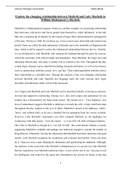Literary Heritage Coursework Molly White
Explore the changing relationship between Macbeth and Lady Macbeth in
William Shakespeare’s Macbeth.
Macbeth is a Shakespearean tragedy written as a perfect example of a promising relationship
that intervenes with power and forces greater than themselves, which ultimately, in the end,
falls into a hopeless pit of disaster by the reason of tragic flaws demonstrated by protagonists
of the play. Written in 1606; the Jacobean era, it was a much more distrustful and somber time
period. Some say reflect the dark undertones of the play due to the instability of England at the
time, which could be argued to mirror the imbalanced relationship between the two. Initially,
we are introduced to Lady Macbeth, who supports her husband through his quest for success,
which she motivates with critical insults and dominance. Then Macbeth, the tragic hero and
ultimately flawed man, who plays a weaker role in contrast to his wife. Throughout the play
certain tragic elements can be identified including; hamartia and hubris, as well as key themes,
such as; partnership, ambition, greed, love, and fate. Their indistinguishable ambition drives
their relationship to a dreadful ruin. Through the analysis of the ever-changing relationship
between Macbeth and Lady Macbeth and language used, the route towards their tragic
downfall, and ultimately death, will be fully discussed.
Act I begins and Macbeth and Lady Macbeth can be described initially as having an intimate,
devoted and supportive relationship. During Act I, they emit respect and admiration for one
another, this is illustrated by the benevolent extract, ‘My dearest love’, ‘Your Highness’, this
lexis of endearment suggests Macbeth is submissive towards his wife, a trope which develops
throughout the play. Indeed, in the eyes of others, Macbeth is shown to be righteous, ‘noble’,
‘brave’ and without fault, as he sets a standard for his reputation from his victory in battle.
However, Lady Macbeth’s dominance can often vanquish Macbeth, as she highlights his
weaknesses with little shame. ‘I fear thy nature’ / ‘it is too full o’th’milk of human kindness.’
She refers to Macbeth as though he is ‘too full of milk’, this could denote softness or purity
suggesting Macbeth is infantile and perhaps not malicious enough to commit the murder of
King Duncan. Ultimately, leaving the impression that Macbeth has better intentions and good
morals. Lady Macbeth recognises his weaknesses and evaluates him harshly ‘when you durst
do it. Then you were a man’ blaming his dominance and questioning his manhood. Although,
the audience is also aware that Lady Macbeth is disingenuous as we can also see Lady Macbeth
hint her superiority over Macbeth numerous times, ‘Leave all the rest to me’, this may reveal
her intelligence and control as this quote also foreshadows her actions for future events that
1




